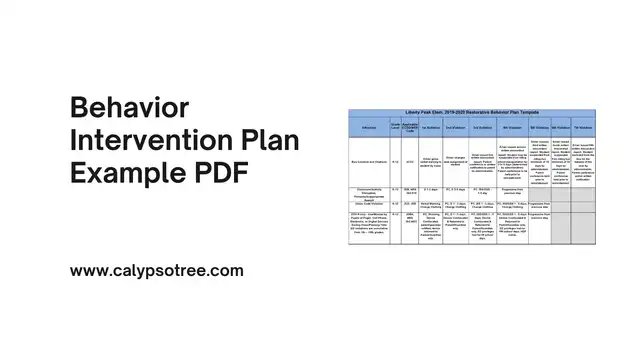Have you ever wondered who keeps the lights on, the water running, and the buildings looking their best? That’s the job of a property manager!
The job description for a property manager is like a to-do list for taking care of buildings and making sure everyone who lives or works there is happy. Let’s dive into what they do and why they’re important.
Job Description for a Property Manager
Property managers are like the caretakers of buildings, making sure everything is in tip-top shape and everyone is happy. Here’s what a typical job description for a property manager includes:
- Financial Management: Property managers are the money experts of the building. They collect rent from tenants, make sure everyone pays on time, and create a plan for spending the money wisely. They also keep track of how much things cost, like fixing things that break or paying the cleaning crew.
- Tenant Relations: A big part of a property manager’s job is making sure everyone in the building is happy. They find good people to live or work there, make sure everyone follows the rules, and help solve any problems that come up.
- Property Maintenance: Property managers make sure the building is in good condition. They fix anything that breaks, like a leaky faucet or a broken elevator, and do regular checkups to make sure everything is safe.
- Marketing: When someone moves out, the property manager needs to find new people to move in. They let people know the space is available, show them around, and choose the best people to join the building community.
Qualifications and Skills for Property Managers
Educational Background
To be a good property manager, you need the right education and training. This includes:
- Real Estate Courses or Degree: Many property managers have taken real estate courses or have a degree in a related field.
- Property Management Certifications: Certifications like Certified Property Manager (CPM) are valuable and show that a property manager has the necessary skills and knowledge.
Essential Skills
Property managers need a variety of skills to do their job well. These include:
- Communication and Interpersonal Skills: Property managers must talk well with tenants and property owners. Good communication helps solve problems quickly and keeps everyone happy.
- Negotiation and Conflict Resolution: They should be good at making deals and solving conflicts. This helps in getting the best terms for leases and resolving any disputes that arise.
- Organizational and Time Management Skills: Property managers need to be well-organized and manage their time effectively. This helps them handle multiple tasks and properties at the same time.
- Financial Literacy and Budgeting: They should understand money matters and be able to create and follow budgets. This ensures the property remains profitable.
- Knowledge of Property Management Software: Knowing how to use property management software is important. It helps in keeping track of all the information related to the property.
Desirable Traits
In addition to skills, certain traits make a property manager more effective. These include:
- Proactive and Detail-Oriented: Property managers should be proactive and pay attention to details. This helps in spotting and solving problems before they become big issues.
- Customer Service Focus: They should focus on providing good customer service. Happy tenants are more likely to stay longer and take care of the property.
- Ability to Work Independently and in a Team: Property managers often work alone but also need to work well with others. This helps in coordinating with vendors, tenants, and property owners.
Salary Expectations and Career Path
Typical Salary Ranges
Property managers can expect different salaries based on their location and experience.
- Salary.com: Property managers in California can earn between $88,000 and $160,000 per year.
- Indeed: Property managers in Florida can earn between $40,000 and $99,000 per year.
- ZipRecruiter: Property managers in California can earn between $17 and $40 per hour.
Career Advancement Opportunities
There are many ways property managers can grow in their careers:
- Senior Property Manager: Oversee more properties and manage a team.
- Regional Manager: Supervise property managers and properties in a larger area.
- Asset Manager: Focus on making properties profitable and valuable.
Common Challenges of Property Management
Property management comes with its own set of challenges. Some common ones include:
- Difficult Tenants: Sometimes, tenants can be hard to deal with. They might not pay rent on time or take care of the property.
- High Vacancy Rates: If a property has many empty units, it can be hard to make enough money.
- Unexpected Maintenance Issues: Things can break without warning, and it can be a challenge to fix them quickly and affordably.
Rewards of Property Management
Despite the challenges, being a property manager can be very rewarding. Some of the rewards include:
Contributing to Property Value Appreciation:
Property managers help increase the value of the property by keeping it well-maintained and occupied.
Building Positive Relationships with Tenants:
They build good relationships with tenants, which can make the job more enjoyable.
The Satisfaction of Resolving Challenges Effectively:
Solving problems and seeing the property run smoothly can be very satisfying.
The Impact of Technology on Property Management
How Technology is Streamlining Tasks
Technology has made many property management tasks easier and more efficient. Some examples include:
- Online Rent Collection: Technology makes it easier to collect rent online. Tenants can pay rent through online platforms, which is convenient for both the tenant and the property manager.
- Property Management Software: Software helps manage properties better. It can keep track of rent payments, maintenance requests, and other important information.
- Virtual Tours and Tenant Communication Tools: Virtual tours and communication tools make it easier to show properties and talk to tenants without needing to be there in person.
Emerging Trends to Watch
There are also new trends in technology that are changing the way property managers work. Some of these include:
- Smart Home Technology Integration: These tools can make properties more attractive to tenants.
- AI-Powered Tenant Screening: AI helps choose tenants more effectively by analyzing data to find the best candidates.
- Data Analytics for Property Performance Optimization: Data analytics helps improve property performance by providing insights into how to manage properties more efficiently.
Legal and Regulatory Considerations
Key Legal Aspects of Property Management
Property managers need to know and follow many laws and rules. Some key legal aspects include:
- Fair Housing Laws: Property managers must follow fair housing laws.
- Landlord-Tenant Laws: They must understand and follow state-specific landlord-tenant laws.
- Eviction Procedures: Knowing the right eviction procedures is important. Property managers must follow legal steps to evict a tenant.
- Staying Up-to-Date with Local Regulations: Property managers must stay informed about local rules and laws. This helps them follow all regulations and avoid legal problems.
Sample Job Description for a Property Manager
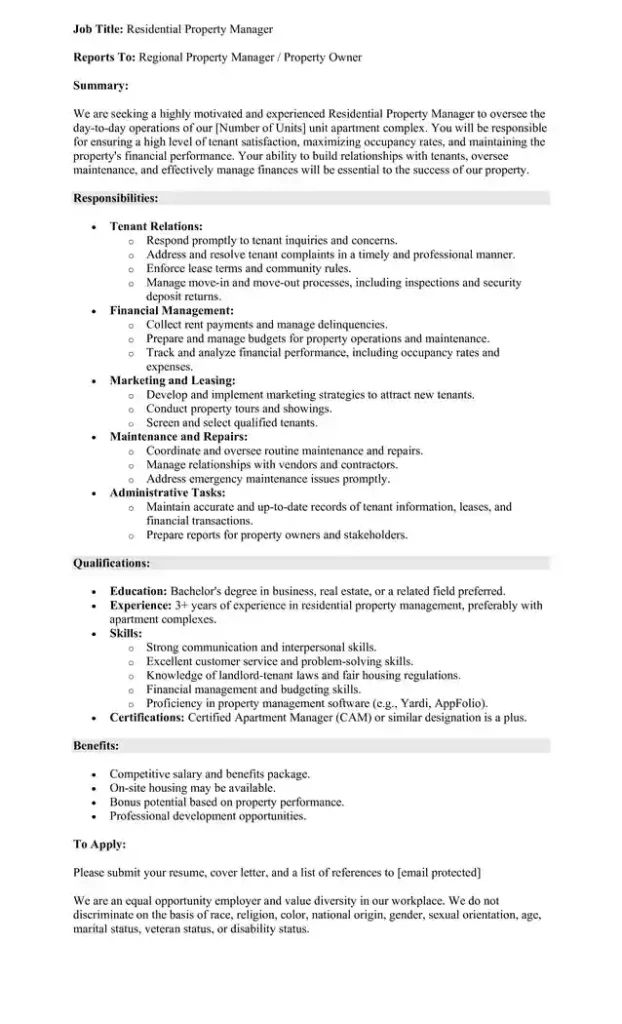
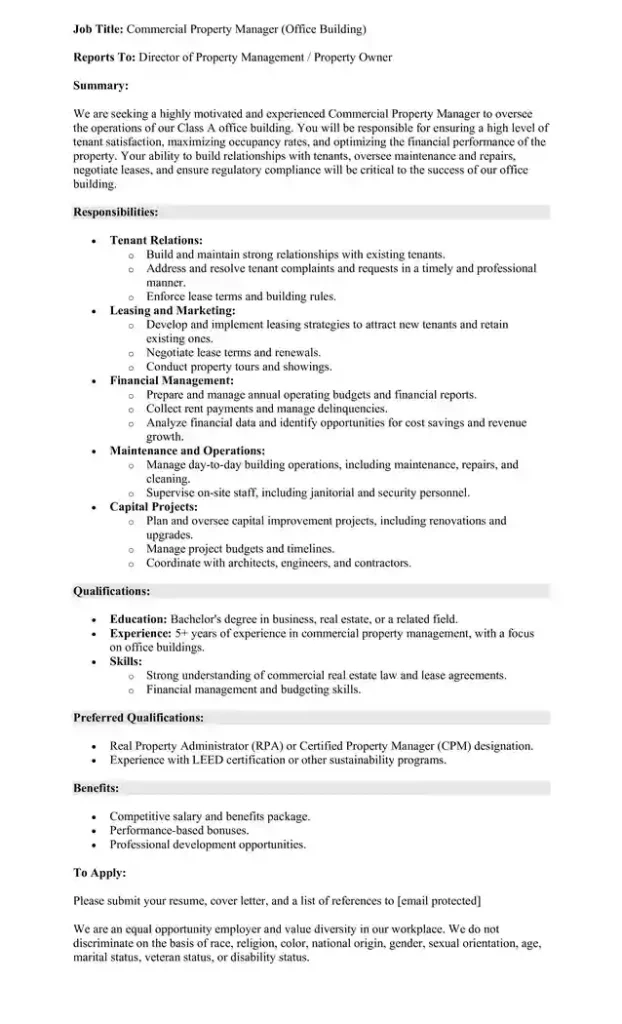
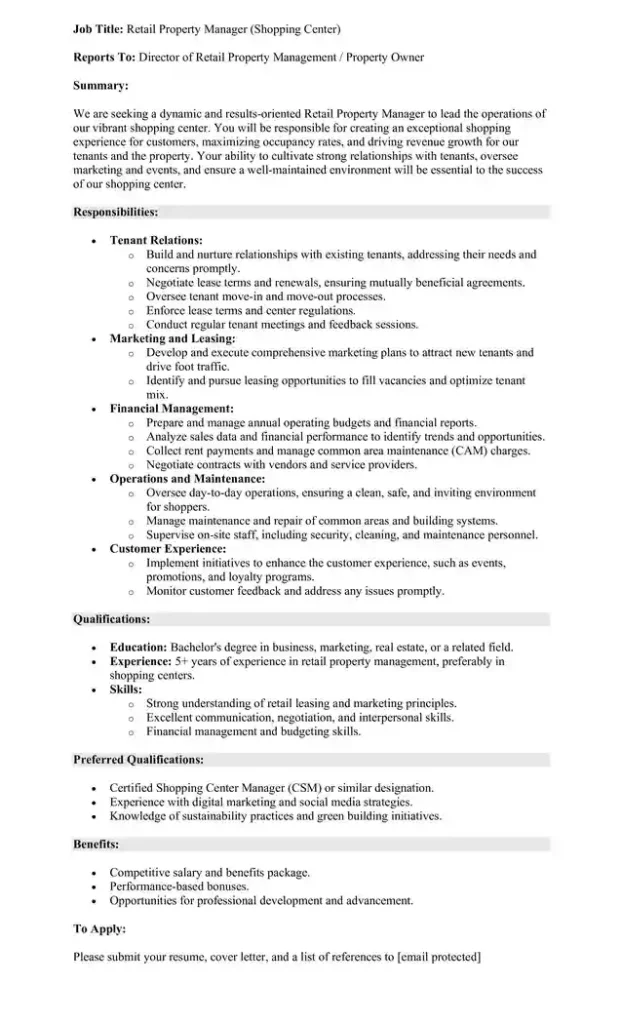
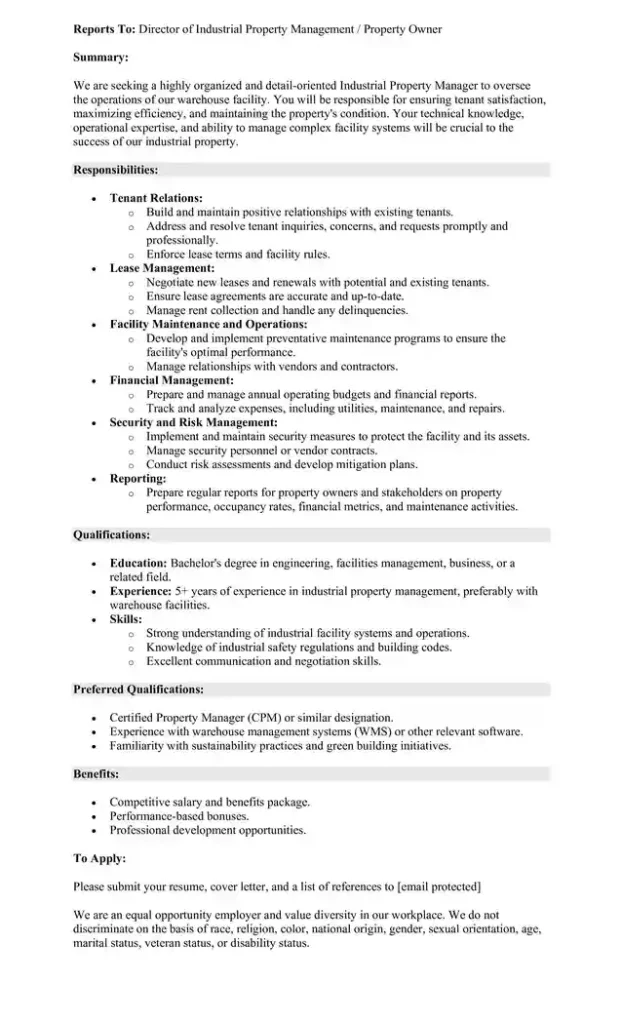
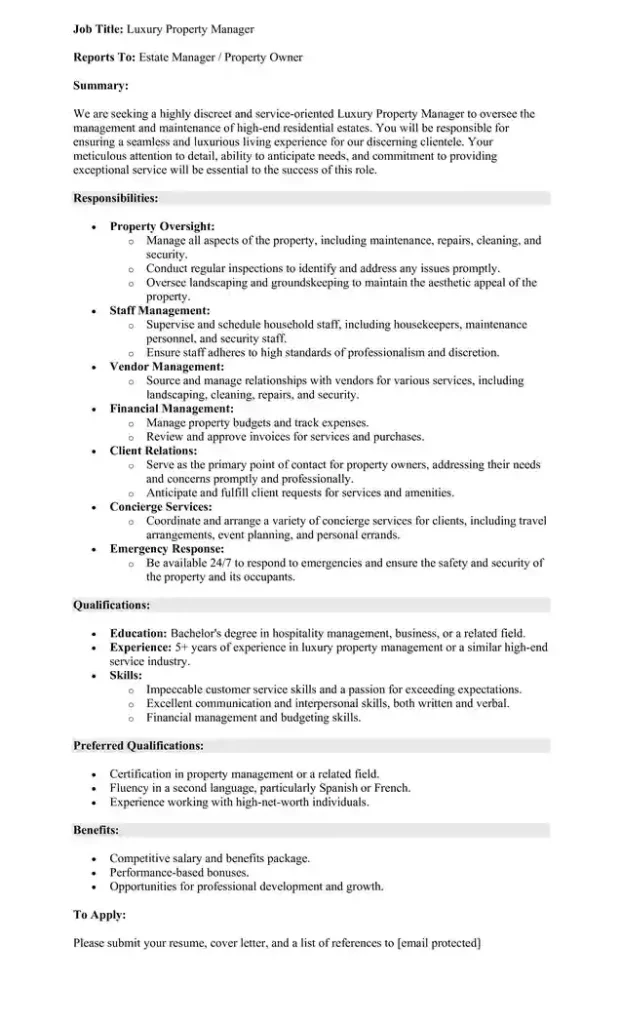
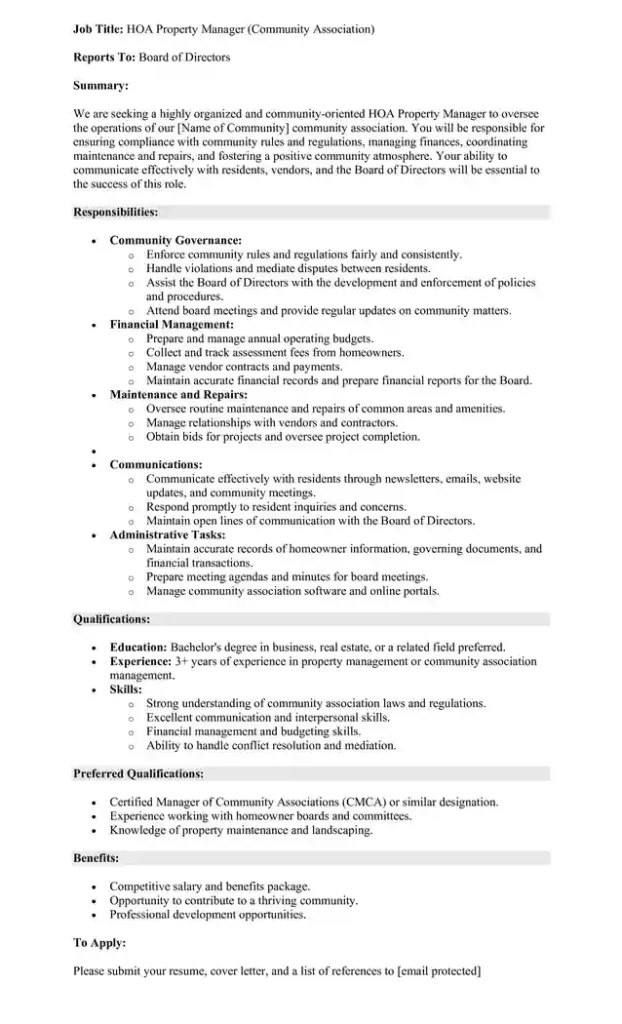
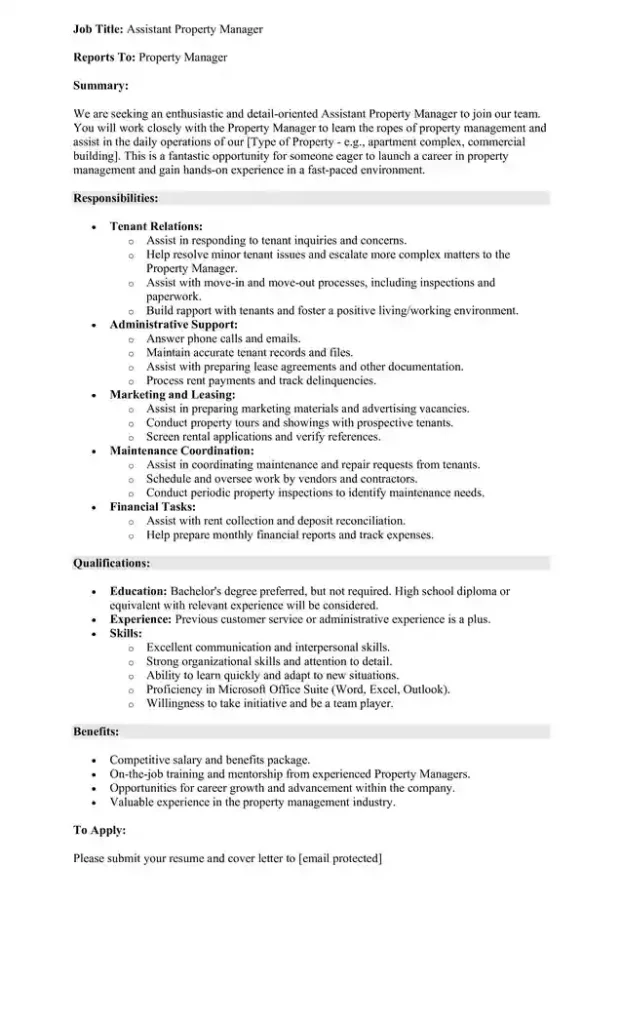
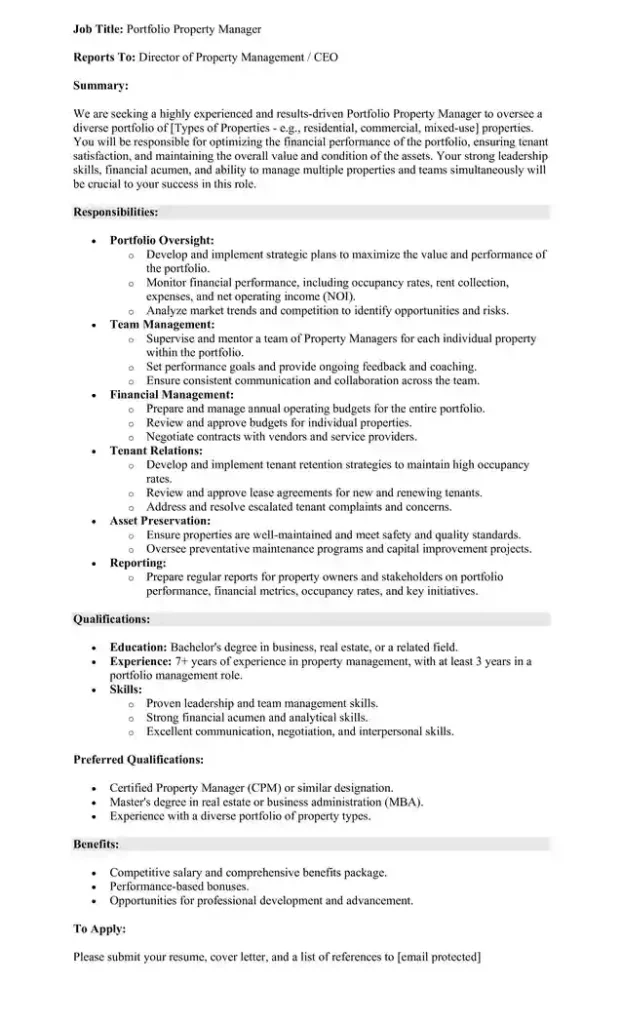
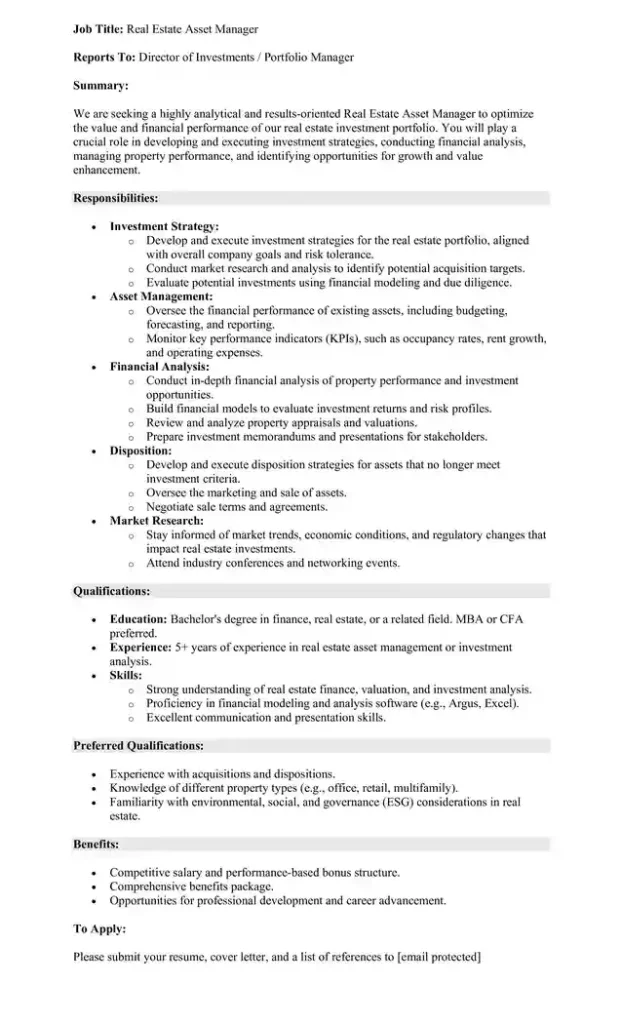
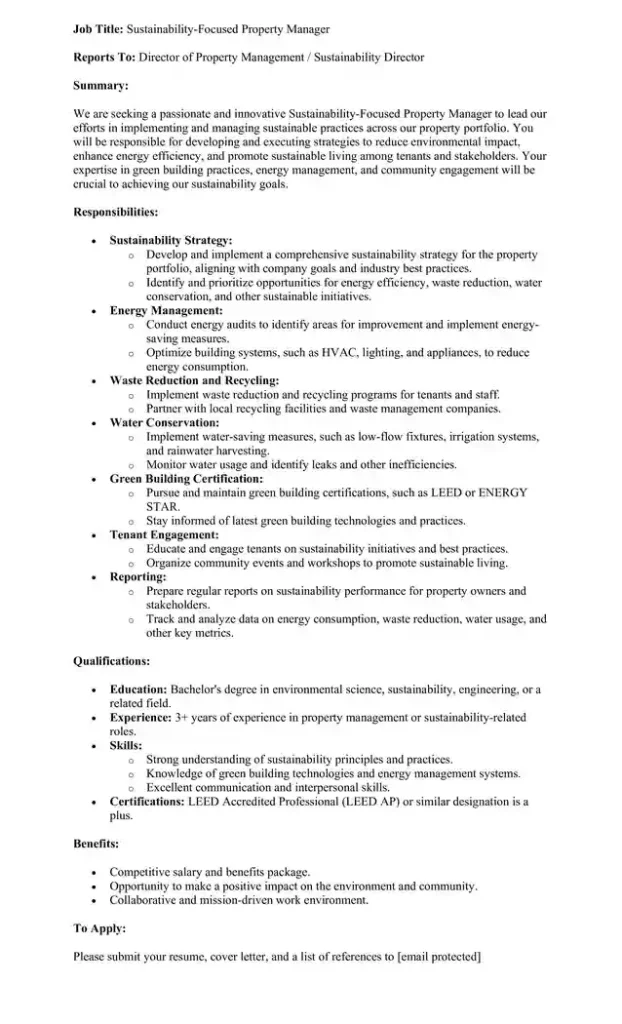
How to Find Property Manager Jobs
Top Resources for Job Seekers
If you are looking for a job as a property manager, there are many resources to help you. Some top resources include:
Online Job Boards
Websites like Indeed and LinkedIn are good places to find job listings for property managers. They also allow you to upload your resume and apply directly online.
Property Management Company Websites
Many property management companies post job openings on their websites. Checking these sites regularly can help you find job opportunities. Look for the “Careers” or “Jobs” section on their websites.
Networking with Industry Professionals
Networking can help you find job opportunities. Attend industry events and join professional organizations to meet people in the field. They provide you with inside information about job openings and can also give you recommendations from people you know.
Attending Real Estate Conferences
Conferences are a great place to learn about the industry and meet potential employers. They often have job boards and networking events. These events allow you to meet and connect with other professionals and learn about new job opportunities.
Conclusion
The job description for a property manager is full of different tasks and responsibilities, all aimed at making sure properties are well-maintained and tenants are happy. It’s a job that requires a mix of people skills, organization, and problem-solving abilities. If you’re a friendly person who loves to help others and keep things running smoothly, this could be the perfect career for you!

Alexander is a skilled HR expert who writes clear and compelling job descriptions. He has spent over 15 years in the HR field, helping companies find and keep the best employees. With a degree in Human Resources Management from the University of Chicago, he has the knowledge to back up his experience.







